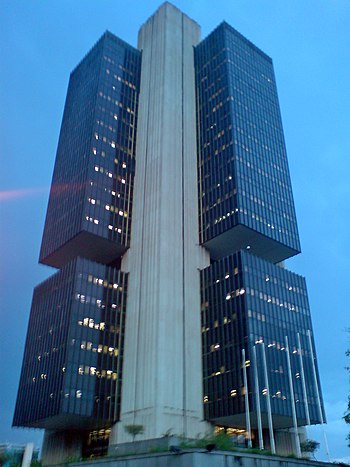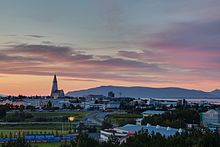The Business and Economics Portal Business is the practice of making one's living or making money by producing or buying and selling products (such as goods and services). It is also "any activity or enterprise entered into for profit." A business entity is not necessarily separate from the owner and the creditors can hold the owner liable for debts the business has acquired. The taxation system for businesses is different from that of the corporates. A business structure does not allow for corporate tax rates. The proprietor is personally taxed on all income from the business. A distinction is made in law and public offices between the term business and a company such as a corporation or cooperative. Colloquially, the terms are used interchangeably. (Full article...) Economics (/ˌɛkəˈnɒmɪks, ˌiːkə-/) is a social science that studies the production, distribution, and consumption of goods and services. Economics focuses on the behaviour and interactions of economic agents and how economies work. Microeconomics analyses what's viewed as basic elements in the economy, including individual agents and markets, their interactions, and the outcomes of interactions. Individual agents may include, for example, households, firms, buyers, and sellers. Macroeconomics analyses the economy as a system where production, distribution, consumption, savings, and investment expenditure interact, and factors affecting it: factors of production, such as labour, capital, land, and enterprise, inflation, economic growth, and public policies that have impact on these elements. (Full article...) Selected articleBank of China (Hong Kong) Limited (BOCHK, 中國銀行(香港)有限公司) is the second-largest commercial banking group in Hong Kong in terms of assets and customer deposits, with more than 300 branches in Hong Kong. It was established on October 1, 2001 from a merger of 12 subsidiaries and associates of the Bank of China in Hong Kong, and listed on the Hong Kong Stock Exchange in October 2002. As of the end of 2003, the bank had HK$763 billion in assets and earned net profit of HK$8 billion in 2003. BOCHK is one of the three banks which issue banknotes for Hong Kong, the biggest member and a founder of the JETCO ATM and payment system, and the designated clearing bank in Hong Kong for transactions involving the renminbi, Mainland China's currency. It is legally separate from its parent, Bank of China (BOC), although they maintain close relations in management and administration and cooperate in several areas including reselling BOC's insurance and securities services. It also shares its Hong Kong headquarters, the Bank of China Tower, with its parent; completed in 1988, this was the first building outside of North America to exceed 1,000 feet (300 m). Selected image
Selected economyThe economy of Iceland is small and subject to high volatility. In 2011, gross domestic product was US$12 billion, but by 2018 it had increased to a nominal GDP of US$27 billion. With a population of 387,000, this is $55,000 per capita, based on purchasing power parity (PPP) estimates. The 2008–2011 Icelandic financial crisis produced a decline in GDP and employment that has since been reversed entirely by a recovery aided by a tourism boom starting in 2010. Tourism accounted for more than 10% of Iceland's GDP in 2017. After a period of robust growth, Iceland's economy is slowing down according to an economic outlook for the years 2018–2020 published by Arion Research in April 2018. Iceland has a mixed economy with high levels of free trade and government intervention. However, government consumption is less than other Nordic countries. Hydro-power is the primary source of home and industrial electrical supply in Iceland. (Full article...) Selected quote"Human wants and desires are countless in number and very various in kind: but they are generally limited and capable of being satisfied. The uncivilized man indeed has not many more than the brute animal; but every step in his progress upwards increases the variety of his needs together with the variety in his methods of satisfying them. He desires not merely larger quantities of the things he has been accustomed to consume, but better qualities of those things; he desires a greater choice of things, and things that will satisfy new wants growing up in him. Thus though the brute and the savage alike have their preferences for choice morsels, neither of them cares much for variety for its own sake. As, however, man rises in civilization, as his mind becomes developed, and even his animal passions begin to associate themselves with mental activities, his wants become rapidly more subtle and more various; and in the minor details of life he begins to desire change for the sake of change, long before he has consciously escaped from the yoke of custom. The first great step in this direction comes with the art of making a fire: gradually he gets to accustom himself to many different kinds of food and drink cooked in many different ways; and before long monotony begins to become irksome to him, and he finds it a great hardship when accident compels him to live for a long time exclusively on one or two kinds of food." TopicsRelated WikiProjectsDid you know (auto-generated) -
On this day in business historyGeneral imagesThe following are images from various business-related articles on Wikipedia.
More did you know
Business news Wikinews Economy and business portal
|





































